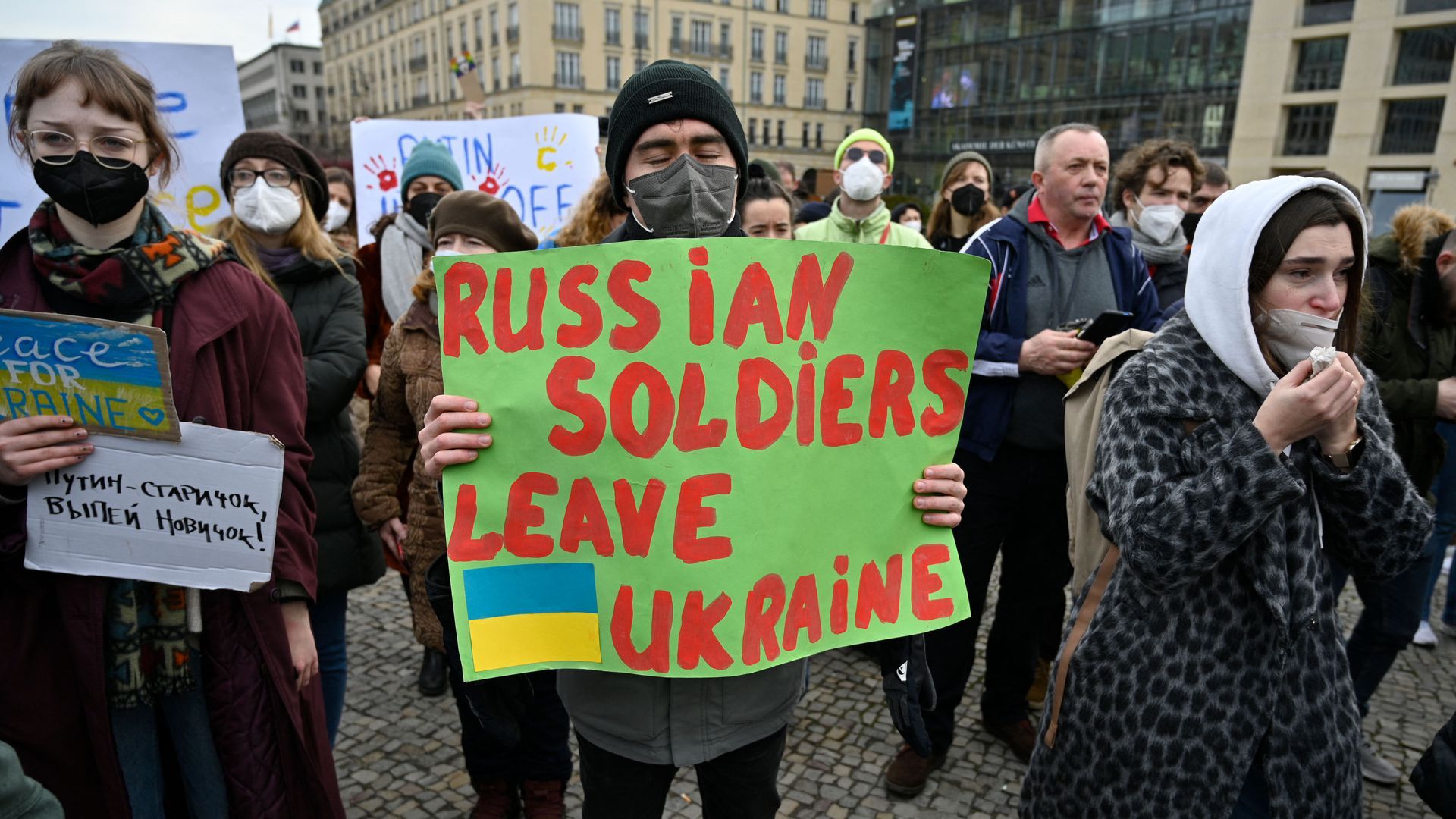Russia's war shakes energy markets
Add Axios as your preferred source to
see more of our stories on Google.

A protest in front of the Brandenburg Gate in Berlin on Thursday. Photo: John Macdougall/AFP via Getty Images
Oil prices jumped above $100 per barrel for the first time since 2014 and European gas prices surged after Russia invaded Ukraine, an assault with far-reaching consequences for energy markets and geopolitics.
Driving the news: The global benchmark Brent crude is up by around $8, trading at roughly $105 per barrel, while U.S. futures are also up similarly sharply at over $99 per barrel.
- Already high natural gas prices in Europe, which relies on Russia for about 40% of its gas imports, soared, too, with futures climbing around 40% on the Dutch TTF exchange.
Why it matters: Beyond the tragic human toll of the Russian invasion, higher energy prices — especially amid wider inflation — will touch everything from the cost of goods as industries pay more for commodities to U.S. drivers' wallets as pump prices climb.
What we're watching: Here are a few things on our radar as the crisis unfolds ...
1. Physical supplies. The assault brings the potential for supply disruptions. Roughly a quarter of Russian gas shipments to Europe move through Ukraine, and these pipelines are vulnerable to bombing or sabotage. Russia is also Europe's largest oil supplier, though overall crude transit through Ukraine is more limited.
2. The sanctions response. President Biden said he plans to meet with G7 leaders today and vowed "our allies and partners will be imposing severe sanctions on Russia." A special meeting of E.U. leaders in Brussels is working to coordinate their response as well, vowing "massive, targeted sanctions."
- U.S. and European sanctions thus far have not targeted Russia's energy sector, though they can have indirect effects.
3. Domestic politics. High gasoline prices are a political problem for Biden and Democrats ahead of the midterms. Biden has said he'll seek ways to address consumer costs, but his options are limited. One thing to watch: the potential for more releases from the Strategic Petroleum Reserve.
4. Energy transition. Europe's reliance on Russian fossil fuels could accelerate its decarbonization efforts, something European Commission President Ursula von der Leyen called for earlier this week.
- But, more broadly, it joins COVID-19 as a factor that will sap attention from global climate efforts.
- The crisis is also underscoring the ability of the U.S. to use liquefied natural gas exports as a geo-strategic tool. And as Axios' Hans Nichols points out, administration officials have recently called on U.S. producers to expand output.
- The surging oil prices could also put new pressure on the Biden administration to loosen its posture on domestic oil-and-gas lease sales.
5. Russian response: Russia has a formidable cyberwarfare capability. It could be difficult to contain its cyberattacks, including those against energy infrastructure, to Ukraine. Deliberate moves against the West are possible.
- A key senator warned Axios' Jonathan Swan and Zach Basu of this on Wednesday.
Analysts are trying to wrap their heads around the crisis.
- S&P Global Platts reports that "oil markets are understandably on edge due to Russia's outsized market position and 2.7 million barrels per day of crude exports to Europe."
- But their analytics unit does not expect sanctions that will significantly curtail supplies, or that Russia will hold back large volumes, the story adds.
- Nonetheless, tight global markets amid the increased demand coming out of the pandemic mean upward pressure on prices as traders weigh the risks from the military invasion.
- "Russia is the third largest oil producer, and second largest oil exporter. Given low inventories and dwindling spare capacity, the oil market cannot afford large supply disruptions," UBS analyst Giovanni Staunovo said via Reuters.
The intrigue: The Russian aggression is putting more focus on the possibility that nuclear talks with Iran could revive a deal that brings more Iranian barrels back onto global markets — some of them soon, given that Iran has some crude waiting on tankers.
- “The only real option that the Biden administration has to increase oil supply in the near term is signing an Iran deal and then convincing Saudi Arabia to produce more," Rapidan Energy Group president Robert McNally told Axios' Hans Nichols.
Go deeper: Ukraine-Russia crisis latest developments

